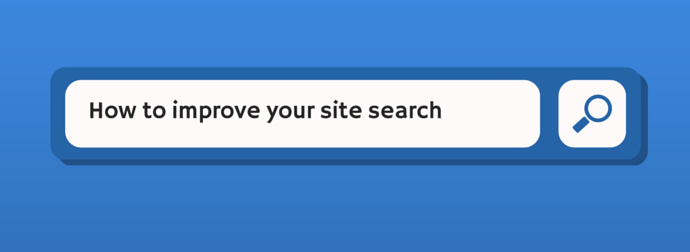- Home
- Blog
- Web Design How to Improve Your Site’s Search Function
How to Improve Your Site’s Search Function
-
 10 min. read
10 min. read
-
 Trevin Shirey
Trevin Shirey VP of Marketing
VP of Marketing
- Trevin serves as the VP of Marketing at WebFX. He has worked on over 450 marketing campaigns and has been building websites for over 25 years. His work has been featured by Search Engine Land, USA Today, Fast Company and Inc.
Have you ever used the site search function on a website, looked at the results, and immediately given up on finding what you were looking for? This has probably happened to you several times, if you think about it. Even some of the best sites on the Internet deliver completely inadequate, confusing, or downright…
well… ugly search results to their users. Who wants to wade through six pages of results just to find one specific page or product?
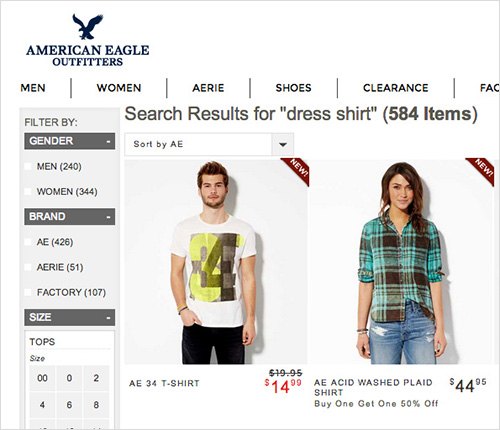
Keep reading to find out how to deliver better results to your visitors — and how to convert more site searches into purchases or leads.
Why is site search so important?
Last August, Smashing Magazine published its research on the current state of ecommerce site search, and the results were pretty shocking. Here’s just a sample of what they found after reviewing the top 50 ecommerce websites in the US:
- 16% of sites didn’t support searching by product name or model number
- 70% required users to search by the exact product type or name that the website used (ex. “blow dryer” wouldn’t return results for hair dryers)
- Only 40% of websites had faceted search (which allows visitors to further filter results by criteria like size, color, etc.)
Not investing in basic site search functionality like this can drive customers away. Visitors who search by model number, for example, are looking for a specific product — and they’re probably ready to buy it. If you don’t show results for it, they’re going to assume you don’t stock it.
The same applies for those who search for “blow dryers” — they’re probably not going to guess you prefer the term “hair dryers.” 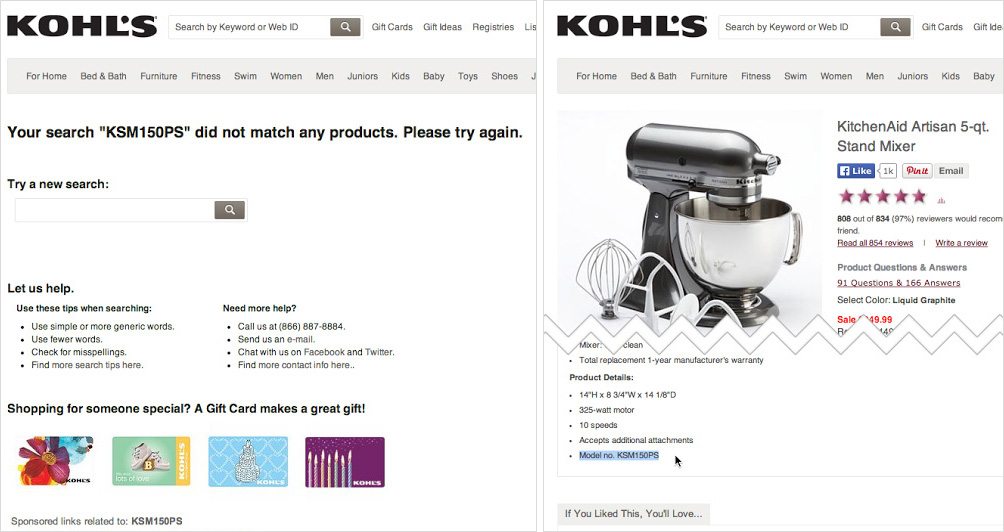
If someone searches for “pricing,” you should be able to deliver your pricing plan page as the first result. If the query is specific to your industry, and all of the pages on your site pertain to it, searchers should be able to filter the results, or easily restructure their query to be more specific. Let’s go over a few ways that you can provide a better search experience to your visitors.
Put it front and center
If you choose to have a site search functionality, make sure your visitors can find it. Ideally, this means sticking it in the header, above or beside your navigation, or as a separate (large) element just below. I’m going to pick on Gap a little bit: how long does it take you to find the search box on their current homepage?
 Your eyes may naturally shift to the top corners, but the combination of the multiple links, top menu, and high-contrast graphics makes the tiny white search box pretty difficult to find. Even worse: the first time I tried to click on the search bar, I clicked the black area and went to a landing page instead. The second time, I moused over the gray “30% off” box and it auto-expanded into a larger ad.
Your eyes may naturally shift to the top corners, but the combination of the multiple links, top menu, and high-contrast graphics makes the tiny white search box pretty difficult to find. Even worse: the first time I tried to click on the search bar, I clicked the black area and went to a landing page instead. The second time, I moused over the gray “30% off” box and it auto-expanded into a larger ad.
When I moved my mouse back down to the new position of the bar, the box collapsed and my search bar was about 150 pixels higher than my cursor again. It was funny, but I couldn’t help but wonder how frustrated I would have been if I was seriously shopping for something.
What if I don’t have site search?
Hey, that’s your choice!
Some sites just don’t need it, especially small ones. If you don’t offer search functionality, however, you should make every effort to compensate for it. This means creating knowledge bases, landing pages, resource lists, category pages, and so on. Your visitors may still want to try to find something really specific, and it’s your responsibility to guide them to it.
It’s a touch ironic that ecommerce software provider Bigcommerce doesn’t have site search, but they do have a pretty impressive resources section filled to the brim with guides, books, and articles, all sorted out in a user-friendly way.  Having said that, if your knowledge base goes past 20 articles, it’s probably time to get search working, even if you’re dead-set on not having one. If I went to Bigcommerce looking for an answer to a question on payment gateways, I would have to spend a couple minutes navigating menus to get to the right spot.
Having said that, if your knowledge base goes past 20 articles, it’s probably time to get search working, even if you’re dead-set on not having one. If I went to Bigcommerce looking for an answer to a question on payment gateways, I would have to spend a couple minutes navigating menus to get to the right spot.
Go beyond autocomplete
The Smashing Magazine study found that a large percentage of the retailers examined had implemented autocomplete for site searches. However, just finishing someone’s thought isn’t always helpful, nor does it always provide the level of filtering that large websites need. Sure, it’s cool when a site guesses what you want, but the results of that search may still be incredibly overwhelming: 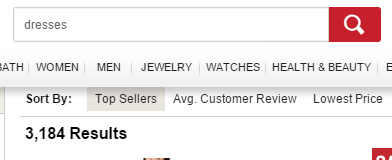
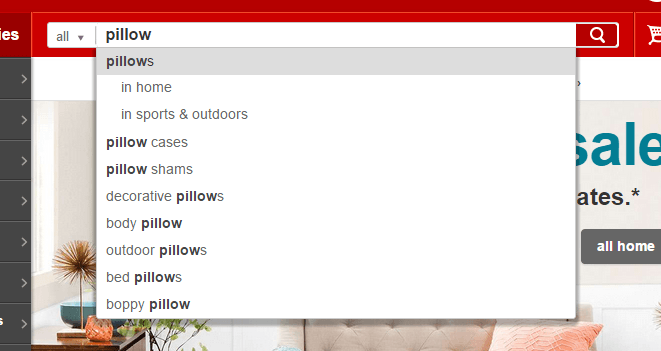 You’ll also notice that Target has two category options — “in home” and “in sports & outdoors” — which means that you can instantly say “yes, I’m actually looking for outdoor pillows for my deck!” and pick the right section from the get-go.
You’ll also notice that Target has two category options — “in home” and “in sports & outdoors” — which means that you can instantly say “yes, I’m actually looking for outdoor pillows for my deck!” and pick the right section from the get-go.
This advanced in-search filtering is really only necessary if you run an ecommerce store with a product type that falls into two or more categories, but it’s a great touch. For example, if you run a clothing store, you may want to give those searching for “tank top” options like “in men’s clothes,” “in women’s clothes,” and so on.
Add faceted search results
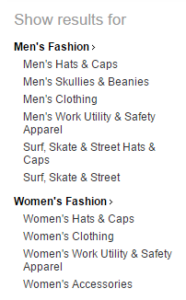 Faceted search, which Google does an incredible job explaining in more detail here, allows your visitors to immediately filter their search results based on criteria you define.
Faceted search, which Google does an incredible job explaining in more detail here, allows your visitors to immediately filter their search results based on criteria you define.
So, for example, when you search Amazon for “hat,” the faceted search option is what allows you to pick from departments, shipping options, prices, and so on. Ecommerce websites absolutely need faceted search (unless they only sell a handful of products). Visitors have come to expect it, and if your store is large, they simply aren’t going to have the patience to sit there and sort through page after page of results to find what they want.
“Why don’t they just search for something more specific then?” you might ask. Well, sometimes your visitors don’t know what they want (what a shocker). They might just want to search for “hat” and have you tell them “this is what we have.” They might not even realize that you carry hats for men as well as for women.
Or they might be lazy! Faceted search is kind of like a waiter telling you a restaurant’s soups of the day. You have a vague idea of what you want, but you don’t know what your options are.
You’d probably be pretty upset if a waiter said “why don’t you just ask me if we have broccoli and cheddar soup?” And you certainly could from the get-go, but you might not always think of it. Your visitors are the exact same way!
Cater to all search types
Of course, there are some people who will come to your website and say “I know exactly what I want!” These are the ones searching by model number, part number, or product name.
Allowing these data pieces to be used as search criteria can give you a huge boost with the audience of comparison or part shoppers. For example, try entering “DCF610S2” on the Ace Hardware website. Rather than take you to a page of results with one item on it, the appropriate product page will pop right up!
 Now, your searchers might not always get these details right. Have you ever heard all the various pronunciations for the Greek “gyro”? Imagine someone who’s never seen that word spelled out trying to search for it online.
Now, your searchers might not always get these details right. Have you ever heard all the various pronunciations for the Greek “gyro”? Imagine someone who’s never seen that word spelled out trying to search for it online.
They might look for “jyro,” or “geero,” “or “giro,” and so on. The same thing is going to apply for someone who has heard a product name in passing, and is trying to find it on your site. So if I knew I wanted a Dewalt brand cordless drill, but wasn’t sure how to spell the brand name, I might enter “Deewalt” into the Ace website: 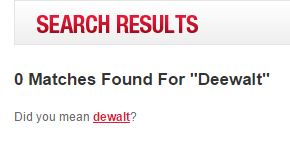 Check it out — they knew what I was looking for!
Check it out — they knew what I was looking for!
Clicking the “did you mean…?” link takes you to a page of Dewalt search results (which, I might add, are filterable from there).
How can I make my site search better?
After reading all these recommendations, you’re probably wondering how you should go about improving your site search. Depending on your site’s content management system (CMS), you probably have a couple options.
Harness the power of Google
Did you know you can enable Google search for your site? Yep! Google Custom Search allows you to add search functionality for your site powered by Google’s engine.
Integration is free, and you can also make money from it (since ads will be shown with results by default). Google also allows you to upgrade your search package to remove ads, customize the design, and support much larger sites with more search queries.
CMS-specific options and add-ons
If you run a hosted ecommerce platform (like Bigcommerce), or use WordPress as your CMS, you can either tinker with your search settings or look for add-ons/plugins that will allow you to expand the functionality of your site search.
For example:
- SearchWP is a WordPress plugin that automatically indexes all your content, including PDFs
- Bigcommerce has a page on filtering and faceting options here
- There’s a plugin for Shopify called Searchify that adds autocomplete, real-time “search intelligence,” and allows for typos
Advanced options
There are also some more advanced plugins and implementation options for non-hosted platforms and sites that don’t use a CMS, like:
- Tipue Search, which runs on jQuery
- Swiftype, which can be added to a site with only a few lines of HTML
You can also talk to your developer or agency about upgrading your site search to support the options you feel are most important, rather than using an “off-the-shelf” solution that may not give you all the options you want (or is really costly). Now that you’ve learned about the importance of site search, are you planning to upgrade or improve yours? Or do you have any questions about search that we can help with?
Let us know in the comments below!
-
 Trevin serves as the VP of Marketing at WebFX. He has worked on over 450 marketing campaigns and has been building websites for over 25 years. His work has been featured by Search Engine Land, USA Today, Fast Company and Inc.
Trevin serves as the VP of Marketing at WebFX. He has worked on over 450 marketing campaigns and has been building websites for over 25 years. His work has been featured by Search Engine Land, USA Today, Fast Company and Inc. -

WebFX is a full-service marketing agency with 1,100+ client reviews and a 4.9-star rating on Clutch! Find out how our expert team and revenue-accelerating tech can drive results for you! Learn more
Make estimating web design costs easy
Website design costs can be tricky to nail down. Get an instant estimate for a custom web design with our free website design cost calculator!
Try Our Free Web Design Cost Calculator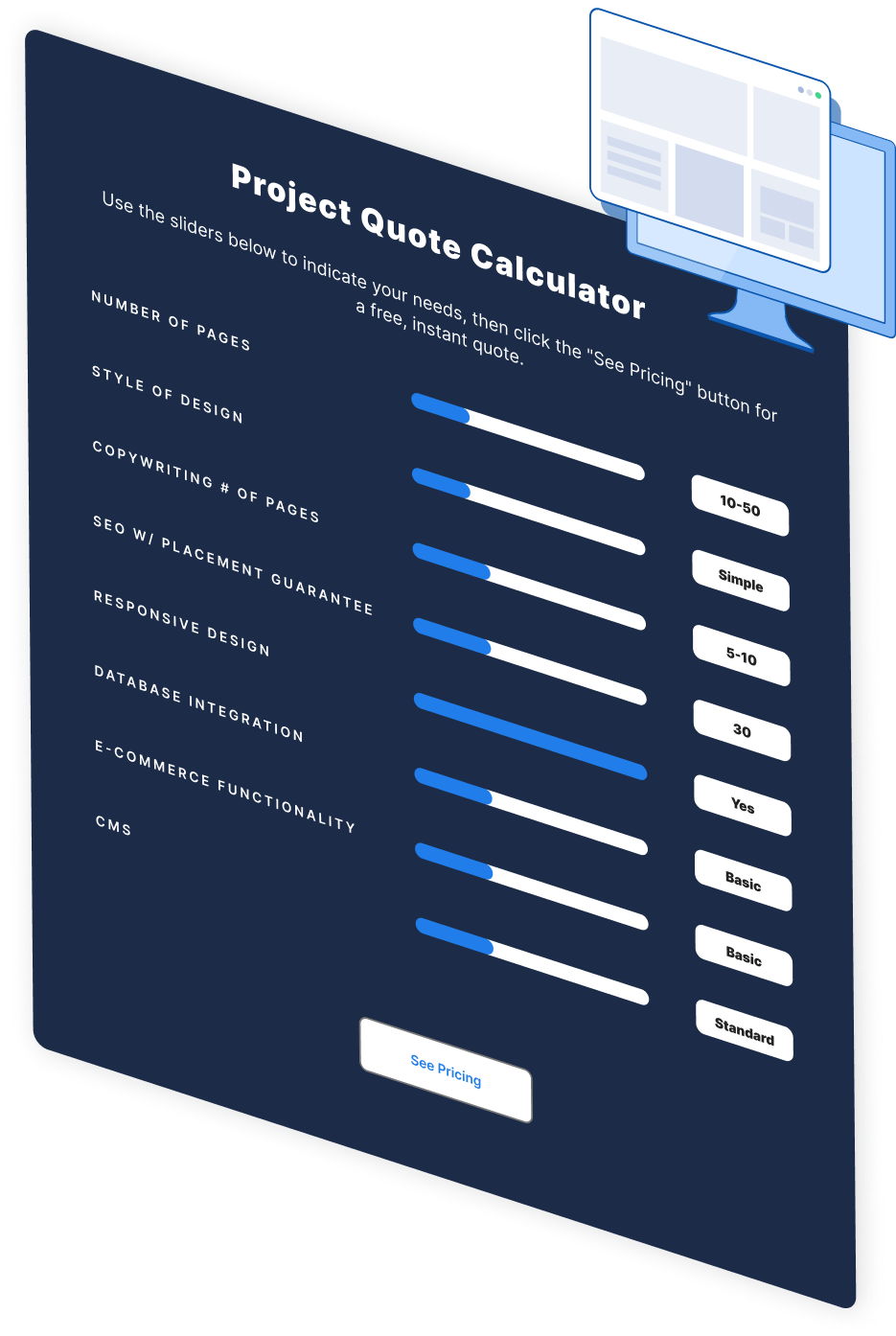


Web Design Calculator
Use our free tool to get a free, instant quote in under 60 seconds.
View Web Design CalculatorMake estimating web design costs easy
Website design costs can be tricky to nail down. Get an instant estimate for a custom web design with our free website design cost calculator!
Try Our Free Web Design Cost Calculator

